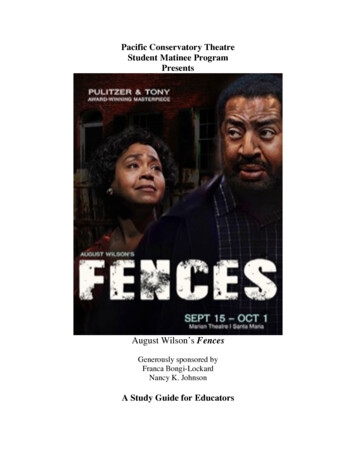
Transcription
Pacific Conservatory TheatreStudent Matinee ProgramPresentsAugust Wilson’s FencesGenerously sponsored byFranca Bongi-LockardNancy K. JohnsonA Study Guide for Educators
Welcome to the Pacific Conservatory TheatreA NOTE TO THE TEACHERThank you for bringing your students to PCPA at Allan Hancock College. Here are somehelpful hints for your visit to the Marian Theatre. The top priority of our staff is toprovide an enjoyable day of live theatre for you and your students. We offer you thisstudy guide as a tool to prepare your students prior to the performance.SUGGESTIONS FOR STUDENT ETIQUETTENote-able behavior is a vital part of theater for youth. Going to the theater is not a casualevent. It is a special occasion. If students are prepared properly, it will be a memorable,educational experience they will remember for years.1.2.3.4.Have students enter the theater in a single file. Chaperones should be one adultfor every ten students. Our ushers will assist you with locating your seats. Pleasewait until the usher has seated your party before any rearranging of seats to avoidinjury and confusion. While seated, teachers should space themselves so they arevisible, between every groups of ten students. Teachers and adults must remainwith their group during the entire performance.Once seated in the theater, students may go to the bathroom in small groups andwith the teacher's permission. Please chaperone younger students. Once the show isover, please remain seated until the House Manager dismisses your school.Please remind your students that we do not permit:- food, gum, drinks, smoking, hats, backpacks or large purses- disruptive talking.- disorderly and inappropriate behavior (stepping on/over seats, throwingobjects, etc.)- cameras, iPods, cell phones, beepers, tape recorders, hand held videogames. (Adults are asked to put any beepers or cell phones on silent orvibrate.) In cases of disorderly behavior, groups may be asked to leave thetheater without ticket refunds.Teachers should take time to remind students before attending the show of thefollowing about a live performance: Sometimes we forget when we come into atheatre that we are one of the most important parts of the production. Without anaudience there would be no performance. Your contribution of laughter, quietattention and applause is part of the play.When we watch movies or television we are watching images on a screen, and what wesay or do cannot affect them. In the theatre the actors are real people who are present andcreating an experience with us at that very moment. They see and hear us and aresensitive to our response. They know how we feel about the play by how we watch andlisten. An invisible bond is formed between actors and a good audience, and it enablesthe actors to do their best for you. A good audience helps make a good performance.PCPA welcomes you as a partner in the live theatre experience from the moment youtake your seats. We hope that your visit will be a highlight of your school year.2
HOW TO USE THIS STUDY GUIDEThe Study Guide is a companion piece designed to explore many ideas depicted in thestage production of August Wilson’s Fences. Although the guide's intent is to enhancethe student's theatrical experience, it can also be used as an introduction to the elementsof a play, and the production elements involved in the play's presentation. The guide hasbeen organized into three major sections:Elements of the storyElements of productionActivitiesTeachers and group leaders will want to select portions of the guide for their specificusage. Discussion questions are meant to provoke a line of thought about a particulartopic. The answers to the discussion questions in many instances will initiate the processof exploration and discovery of varied interpretations by everyone involved. This can beas rewarding as the wonderful experience of seeing August Wilson’s Fences on-stage.Derrick Lee Weeden as Tony and Karole Foreman as Rose3
PRODUCTION TEAM AND CASTAugust Wilson’sFencesDirectorScenic DesignerCostume DesignerLighting DesignerComposerFight DirectorStage ManagerTimothy BondJason BolenDeb TroutTim ThistletonMichael G. KeckMark BooherEllen BeltramoCAST OF CHARACTERSTroy MaxsonJim BonoRoseLyonsGabrielCoryRaynellDerrick Lee Weeden*Michael j. Asberry*Karole Foreman*Satchel AnrdreMichael G. KeckChris MansaKandace Flowers* Actor’s Equity Association4
ELEMENTS OF THE STORYSynopsis of the ProductionTroy Maxson, like many black men of his era, fled north toescape the horrible sharecropping conditions in the South. He livedin shacks, resorted to stealing, and spent some 15 years in jail forkilling a man he tried to rob who shot him before Troy killed himwith a knife. He became a talented baseball player in the NegroLeagues, but was overlooked by the major leagues because of his age- just as they began to accept Negroes. Troy is now picking upgarbage and is pushing his boss to allow blacks to drive the garbagetrucks. His friend and payday drinking buddy, Bono, thinks Troy hasbeen cheating on his wife, Rose. Troy’s son Cory is being recruited bya college football team which Troy is convinced will lead nowherebased on his own experience with discrimination. Cory breaks thenews to Troy that he’s quit his job at the A&P so he can play footballafter school which does not sit well with Troy. Rose reminds Troyabout the fence she wants built.Troy’s brother Gabriel suffered a brain injury in the war. Hecarries an old trumpet on a string tied around his waist. Gabriel hasmoved out of the Maxson house and into a boarding house. It was hiscompensation check from the government that went to buy theMaxson house and his monthly stipend has been going toward themortgage.Later in the day, Cory and Troy are working on the fence andthe discussion turns to the football recruiter. Troy is convinced thewhite men will never let his son get ahead in sports and that he needsto get his job back and learn a skill, and then defiantly assures Corythat he’ll never sign the permission paper Cory needs to get thefootball scholarship. Cory asks why Troy doesn’t like him which setsTroy off explaining a father’s duty is to provide for his son and likinghim has nothing to do with it. Rose tries to convince Troy to let theirson play football reminding Troy he was too old for the majorleagues and he should recognize that the world has changed.A couple weeks have passed and Troy has successfully brokenthrough the color barrier at work and is now allowed to drive thetrash truck. Troy starts reminiscing about the horrible conditions as ayouth and the brutal abuse he endured from his father and how hewalked 200 miles to escape that environment. When he arrived inPittsburgh he couldn’t find a job and survived by stealing food andthen money. He admits that the time he spent in jail cured him from5
wanting to rob people.Troy learns that Cory has been lying and hasn’t kept his jobwith the A&P. Cory has come in upset because he’s learned that Troyhas told the coach that Cory can’t play football anymore and told himto call off the college recruiter. His disrespect earns him “strike one.”Another day, Troy and Bono are in the backyard talking andBono is concerned with Troy’s growing attention to Alberta and hedoesn’t want Troy to wreck his 18 year marriage with Rose. But ashort while later Troy is admitting to his affair to Rose, and thatAlberta is pregnant. Rose can’t believe what she’s hearing as Troytries to justify his affair. Rose tries to leave but in a rage Troy grabsher arm as Cory enters and fights with Troy. Troy restrains himselffrom seriously hurting Cory and proclaims, “that’s strike two.”Six months later, Troy is leaving the house as Rose informs himthat Gabriel has been committed to a mental hospital and accusesTroy of selling his brother out by signing the commitment papers toget a part of his government check. Things go from bad to worsewhen he hears that Alberta died during child birth, though the babyis healthy. Rose agrees to help care for the baby they’ve namedRaynell, but from now on, she refuses to accept Troy back into herlife.Seven years later the family is preparing for Troy’s funeral.Gabriel attempts to blow his trumpet before “the gates of heavenstand open as wide as God’s closet.”Michael G. Keck as Gabriel, Carole Foreman as Rose andDerrick Lee Weeden as Troy6
About The PlayFences is the third of 10 plays (The American Century Cycle) AugustWilson penned to dramatize the black experiences in the UnitedStates with each play representing each decade of the 20th century. Itwon the 1987 Tony Award for Best Play and the Pulitzer Prize forDrama in the same year. Set in 1950s Pittsburgh, Fences centers onTroy Maxson, a trash collector and former baseball hero in the NegroLeague, whose inner conflicts take their toll on his relationships withhis wife, children, and friends as they look to their own chances tofulfill their dreams. Wilson’s most renowned work, Fences wasdeveloped at the National Playwrights Conference in 1983premiering at the Yale Repertory Theatre in 1985. It played onBroadway in 1987 featuring James Earl Jones as Troy Maxson. Inaddition to the Tony for Best Play, it also won Best Performance by aLeading Actor in a Play, Best Performance by a Featured Actress in aPlay, Best Featured Actor in a Play, and Best Direction of a Play. Italso won Drama Desk Awards for Outstanding New Play,Outstanding Actor in a Play, and Outstanding Featured Actress in aPlay. A revival in 2010 featured Denzel Washington as Troy Maxsonand Viola Davis as Rose. It was nominated for ten Tony Awardswining Best Revival of a Play, Best Actor in a Play, and Best Actressin a Play. A film adaptation directed by Denzel Washington in whichhe also starred with Viola Davis, reprising their roles from theBroadway production, was released last year. It was nominated forfour Oscars: Best Picture, Best Actor, Best Supporting Actress, andBest Adapted Screenplay. Davis won for her performance.Washington and Davis also received Golden Globe nominations fortheir performances.Timothy Bond, who has directed seven of Wilson’s Century Cycleplays, said he is honored to be directing the first August Wilson playin PCPA’s history, “Mr. Wilson is considered by many to be theAmerican Shakespeare. His ‘American Century Cycle’ exploring theheritage and experience of African Americans, decade by decade,over the course of the 20th Century, is one of the monumental feats inthe history of theatre. The design team’s focus has been aboutcapturing the gritty truth and poetic blues-scape of the MaxsonFamily household which consists of an ancient two-story brick housein a dirt yard in the hill district of Pittsburgh in 1957. I am veryexcited about our stellar cast led by the amazing Derrick Lee Weeden7
and Karole Foreman as the unforgettable characters of Troy and RoseMaxson. The contagious humor, brilliant storytelling, powerfuldialogue and soulful songs make Fences an unforgettable AmericanClassic.”Bond said there is much in this story he can personally relate to. Likethe character Troy Maxson, Bond believed he would eventually playprofessional baseball until suffering an injustice and an injury thatextinguished his dream. Beyond that he said, “It is significant to meto be telling this story in the Post-Obama Era in America, when manypeople in this nation are reawakening to the reality that there is stillmuch work to be done to equal the playing field for people of colorand women. As a person of color I have also faced racialdiscrimination in a number of ways throughout my life and live withthose scars. I believe that by exploring African-Americanperspectives and culture, and examining America’s legacy of racialdiscrimination all Americans have a chance to holistically proceedinto the future.”This play uses many metaphors for the fence Troy Maxson isbuilding. Timothy Bond continues, “We learn that a psychologicalfence went up around Troy after his father severely beat him andchased him off when he was only 14 years old. We also learn thatTroy was an extraordinary Negro League baseball player, a home runslugger who hit balls 450 feet over fences. But when he is deniedplaying in the Major Leagues due to the color of his skin, this erects adevastating fence of injustice that mars his ability to see the fewpositive changes happening around him. Troy, scarred by racism andby the cycle of abuse from his father, seems doomed to repeat thispattern with his family. The cycle of dysfunction and separationseems like it will destroy the Maxson family and all of Troy’srelationships.”8
About The AuthorAUGUST WILSON (April 27, 1945 – October 2, 2005)authored Gem of the Ocean, Joe Turner’s Come and Gone, Ma Rainey’sBlack Bottom, The Piano Lesson, Seven Guitars, Fences, Two TrainsRunning, Jitney, King Hedley II, and Radio Golf. These works explore theheritage and experience of African-Americans, decade-by-decade, over thecourse of the twentieth century. His plays have been produced at regionaltheaters across the country and all over the world, as well as on Broadway.In 2003, Mr. Wilson made his professional stage debut in his one-manshow, How I Learned What I Learned. Mr. Wilson’s works garnered manyawards including Pulitzer Prizes for Fences (1987); and for The PianoLesson (1990); a Tony Award for Fences; Great Britain’s Olivier Awardfor Jitney; as well as eight New York Drama Critics Circle Awards for MaRainey’s Black Bottom, Fences, Joe Turner’s Come and Gone, The PianoLesson, Two Trains Running, Seven Guitars, Jitney, and Radio Golf.Additionally, the cast recording of Ma Rainey’s Black Bottom received a1985 Grammy Award, and Mr. Wilson received a 1995 Emmy Award9
nomination for his screenplay adaptation of The Piano Lesson.Mr. Wilson’s early works included the one-act plays The Janitor,Recycle, The Coldest Day of the Year, Malcolm X, The Homecoming, andthe musical satire Black Bart and the Sacred Hills. Mr. Wilson received
Fences is the third of 10 plays (The American Century Cycle) August Wilson penned to dramatize the black experiences in the United States with each play representing each decade of the 20th century. It won the 1987 Tony Award for Best Play and the Pulitzer Prize for Drama in the same year. Set in 1950s Pittsburgh, Fences centers on Troy Maxson, a trash collector and former baseball hero in the .











